|
|
Reviewed by Glenn Erickson
The great picture Places in the Heart (1984) didn't receive anywhere near the attention it deserved, despite taking home two well-earned Oscars. Sally Field had toutched kitsch heaven with her Oscar acceptance gush, a spectacle that didn't add to her star power. But Norma Rae remains a winner, and she's even better in this second acting triumph. Robert Benton's down-home Texas tale impresses because it's a real writer-director's picture, from a decade when much of Hollywood forgot how to makes us care about the characters in the stories they told.
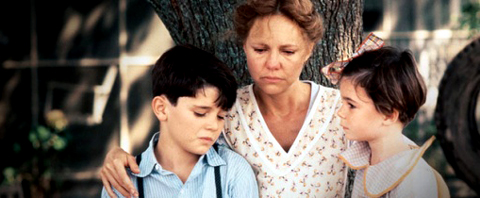
This story takes place at a very lean time. Even the images in Places in the Heart seem to be rationed out, giving the movie the same sparse feeling as its disadvantaged characters. When her Sheriff husband Royce (Ray Baker) is suddenly killed, new widow Edna Spalding (Sally Field) determines not lose her farm, despite the condescending attitude of her banker Albert Denby (Lane Smith). To prevent the bank from repossessing her house immediately, Edna takes in Denby's handicapped relative Mr. Will (John Malkovich), a blind boarder with a negative attitude. With help from her generous sister Margaret Lomax (Lindsay Crouse) and homeless sharecropper Moze (Danny Glover), Edna faces up to everything the harsh Southern society and nature can throw at her.
In terms of sheer quality, Places in the Heart harks back to Elia Kazan's earthy, sensitive Wild River. Like the Kazan movie, Heart captures a living & breathing feeling of rural Texas during the Depression. 1 Waxahachie is where writer-director Robert Benton was born, and this must be his valentine to his hometown. Places in the Heart has the kind of detail that made Benton a hot property twenty years before with his Bonnie & Clyde screenplay. The costumes, settings, and lighting have a genuine, lived-in feeling. Best of all, Benton's assured and delicate direction (Kramer vs. Kramer) creates the kind of intimacy where the slightest facial expression can evoke a life changing before our eyes.
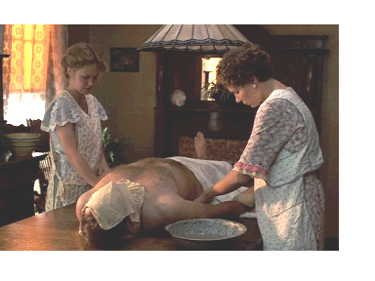
Benton attacks the social-problem issues in his story with great assurance. The Lillian Hellman / Horton Foote / Arthur Penn / potboiler The Chase slandered Texas as a cesspool of violence and racial evil. From the Kennedy assassination forward the only Southerners depicted in liberal movies were bad Southerners. Places in the Heart pits the relatively defenseless Edna Spalding against a contemptuous bank manager and a redneck Cotton Gin operator (well-played by Jay Patterson). Her ordeal is a personal experience rather than a blanket indictment of the South. Racism is fairly presented, without the conspicuous modern flaw -- the so-called 'good' people, even Edna and Margaret, are also part of the 1930s mindset. Margaret must walk past the corpse of a lynched black man, tied to the back of a car. She's angry and disapproving, but is not in the least surprised. It's how things were.
The acting on view is breathtaking. Sally Field is better than ever. Her fight to save her family has a female ferocity matched only in fantasies like Aliens. Yet her performance is not a series of grandstanding, "I'll never go hungry again" moments. 2 John Malkovich was a fairly new presence when this movie was made (it's hard to believe, I know) and he's great. He crafts a vivid portrait of a man who has pride even when he's shamefully foisted on a landlord who doesn't want him. The two kids are handled as perfectly as those in Benton's Kramer vs. Kramer. And Benton tosses in a handful of side relationships that are as strong as the leads. Nobody's doing particularly well in Waxahachie. Beautician Margaret (an excellent Lindsay Crouse)
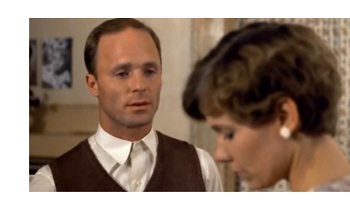 has a wastrel husband, Wayne (Ed Harris) who is cheating on her with schoolteacher Viola Kelsey (Amy Madigan, also marvelous). These people don't have the luxury of letting a thing like infidelity interfere with the tenuous social order, or the necessity to subsist. As in that other Texas story, The Searchers, the whole situation is handled with the utmost delicacy by all involved. Is Viola's husband (Terry O'Quinn) ignorant of the situation, or is he quietly hoping that the affair will burn itself out? An involuntary hand-gesture during a card game is all that's required to spill the beans. The drama is momentarily set aside when a tornado rips through Waxahachie. Viola takes her grammar school children into the strong room of her little schoolhouse, and must hide there while the storm's pressure wave makes building after building literally explode. Viola's terror must mirror that of hundreds of thousands of Midwesterners that have decided to flee the region after surviving such an experience.
has a wastrel husband, Wayne (Ed Harris) who is cheating on her with schoolteacher Viola Kelsey (Amy Madigan, also marvelous). These people don't have the luxury of letting a thing like infidelity interfere with the tenuous social order, or the necessity to subsist. As in that other Texas story, The Searchers, the whole situation is handled with the utmost delicacy by all involved. Is Viola's husband (Terry O'Quinn) ignorant of the situation, or is he quietly hoping that the affair will burn itself out? An involuntary hand-gesture during a card game is all that's required to spill the beans. The drama is momentarily set aside when a tornado rips through Waxahachie. Viola takes her grammar school children into the strong room of her little schoolhouse, and must hide there while the storm's pressure wave makes building after building literally explode. Viola's terror must mirror that of hundreds of thousands of Midwesterners that have decided to flee the region after surviving such an experience.
Benton's honesty continues to be refreshing. Places in the Heart handles its racial theme well. Danny Glover's Moze (another Searchers reference?) is a hardy survivor, not a representative of the Civil Rights movement still twenty years in the future. He acts out of pragmatic self-preservation rather than a sentimental notion of the kind that writers insist on attributing to 'downtrodden but noble' black characters. Moze's affection for his feisty employer and his personal commitment to her crusade to keep her family together come from the same reasons we all commit ourselves to help one another -- good people bring out the best in each other. The most treacherous stock scene in this kind of film is the 'facing up to the Klan' cliché, which Benton & Co. handle perfectly. Immediate tragedy is averted but life can't go on as it did before. Beautiful things happened on the Spalding farm, but there's no utopian future there either.

Edna's triumph over foreclosure and the Cotton Gin would ring hollow if the show ended with a secure future assured for the Spalding farm and its improvised family. For most people lacking outside means, the depression just didn't work out like that. These were the years of the Okie migration. The film's most accurate image is probably the sight of schoolteacher Amy Madigan and her husband, leaving town for the big city.
(spoiler - caution)
The real climax of the picture comes when a beaten and bloody Moze walks away into the blackest of nights, like Paul Muni in I Am a Fugitive from a Chain Gang. The day has been saved, but what will happen next year without Moze to bring in the cotton? Edna won't be able to repeat her successful outcome with the Cotton Gin operator the next time around. Even with Moze gone, the local Klan will keep her name on their enemies list. If Benton could have ended his film with that feeling of insecurity, he'd have a grim but honest film. He instead reaches for the uplift of a poetic finish.
(now a total spoiler)
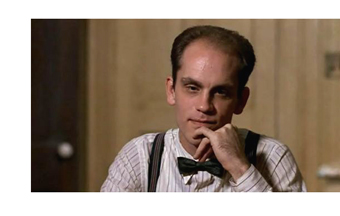
What we get is a surprise, an ethereal conclusion outside of reality. Robert Benton's parting note is not a lame feel-good ending, but a quiet, mystical finale that embraces its characters' faith and hopes. Benton uses the rite of communion to express the soul of the old Waxahachie, the sorely missed communal values that were wiped out by the dust bowl and progress in general. A hymn called 'Blessed Assurance' plays. In a dialogue-free tracking shot up and down the church pews, we experience a miracle. The unfaithful can be forgiven, the homeless can find a home and the exiled can return. Killer and victim can share bread and wine, with sins and tragedies set aside. It's a pious reverie, that communicates a rare feeling of utopian bliss. It's the most cinematic vision of benign Christian mysticism Savant's yet seen and it has a powerful emotional impact.
But it took a Christian sensibility keener than my own to perceive that Benton's Places in the
Heart is bookended by communion scenes. Remember the opening confrontation at the railroad tracks? Sheriff Spalding's pockets are stuffed full of biscuits purloined from his dinner table. The luckless Wylie (De'voreaux White) swings a bottle of wine in one hand. Their fates are joined together in the embrace of a forgiving faith. It's an equally faith-driven sequence, the equal of the poetically devout movies of Carl Dreyer. It's enough to inspire one to get Religion.
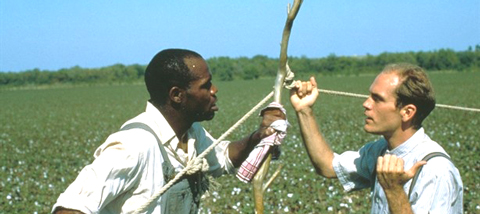
The Twilight Time Blu-ray of Places in the Heart is a fine encoding of this overlooked classic. It's true that Sally Field plays the cliché of a woman who discovers strength and character through adversity. Just the same, she's excellent. For kids in need of a lesson about 'square' people trying to make their way in hard times, this show is possibly a better introduction to the Depression era than The Grapes of Wrath. I'm a big fan of Sally Field. She survived a show about a nun that flies, and kept her dignity. She wasn't considered for a lot of movies, but when Bob Rafelson and Martin Ritt came her way, she delivered. And hey, she's a different kind of Hollywood royalty. Her mother was Margaret Field, a Hollywood actress but not a big star. I should think that the younger Ms. Field earned everything she got. She conveys a fresh, no-nonsense attitude on TCM's Essentials with Robert Osborne.
The rich transfer of Néstor Almendros' studied cinematography is always
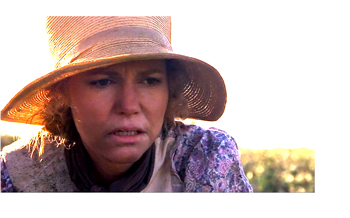 pleasing to the eye; with his work we're never aware of artificial lighting. I only noticed a couple of early scenes, as when Wayne and Viola have a rendezvous at an abandoned farmhouse, seem a bit off, as shadows have a slightly greenish tinge. Of special note is the nicely chosen music. A bluegrass and folk group performs at a dance; the main singer is played by the great Bert Remsen Thieves Like Us. A later, there-for-its-own-sake scene of Remsen singing in a car while the rest of his band sleeps, is magical.
pleasing to the eye; with his work we're never aware of artificial lighting. I only noticed a couple of early scenes, as when Wayne and Viola have a rendezvous at an abandoned farmhouse, seem a bit off, as shadows have a slightly greenish tinge. Of special note is the nicely chosen music. A bluegrass and folk group performs at a dance; the main singer is played by the great Bert Remsen Thieves Like Us. A later, there-for-its-own-sake scene of Remsen singing in a car while the rest of his band sleeps, is magical.
The show has TT's special Isolated Score Track feature. Nick Redman conducts a fine commentary with star Sally Field; I really like her personality. A trailer is included. Julie Kirgo's liner notes show her (I think) to be in awe of the film, which seems proper. She reminds us that Ms. Field won the Best Actress Oscar yet again for this performance, as did Robert Benton for his screenplay.

On a scale of Excellent, Good, Fair, and Poor,
Places in the Heart Blu-ray rates:
Movie: Excellent
Video: Excellent
Sound: Excellent English 1.0 DTS-HD MA
Supplements: Isolated Score Track, commentary with Sally Field and Nick Redman, trailer, Julie Kirgo liner notes
Deaf and Hearing Impaired Friendly?
YES; Subtitles: English
Packaging: Keep case
Reviewed: July 25, 2015
Footnotes:
1. One hymn used in Places in the Heart is the same plaintive tune sung by Lee Remick in Wild River. That 1960 movie is still a remarkably evocative portrait of rural Southern Americana, especially considering that it was made by an Armenian / Greek immigrant from New York.
Return
2. Gone With the Wind, what a piece of work that is. Scarlet O'Hara's, "I'll never go hungry again" speech is really saying, "That's it. I don't care who suffers or dies, I'm coming out on top." That's the human condition, I guess.
Return
3. Informed input from fave advisor 'woggly', 7.28.15. I've already incorporated his corrections:
Dear Glenn: Sally's acceptance speech for Norma Rae at the Oscars for 1979 was comparatively simple and eloquent. She was exultant at first, then thanked John Alonzo and, particularly, Marty Ritt, and her two sons.
Five years later, though, when she ascended the podium again for Places in the Heart, she was a bit overwhelmed. Well, winning two Oscars in five years is a feat. Field thanked Robert Benton, her co-stars, her family... and then she launched into the part that everybody remembers:
"I haven't had an orthodox career... and I wanted more than anything to have your respect. The first time, I didn't feel it. But this time I feel it, and I can't deny the fact you like me -- right now, you like me!"
It didn't really hurt her star power, but people have never stopped talking about this...
Broadway's John Kander penned the spare melodic background score for Places in the Heart, but the movie's period source music (possibly along with some archival bluegrass recordings) was supervised and produced by Howard Shore. While there was no soundtrack album issued of the Kander score (there was likely too little of it to make up more than one side of an lp), Varese Sarabande did release a Places soundtrack album of the Shore-produced and selected material. The lp featured Doc Watson, Merle Watson, and The Texas Playboys circa 1983-84: Leon Wm. McAuliffe, Alton M. Stricklin, Gene C. Gasaway, Bobby L. Boatright, Joe F. Ferguson, Smoky Dacus, and Eldon E. Shamblin. The album also included the church finale music with the choir and church pianist Cheryl Hardwick (church pianist). I recall it as being atmospheric and well done, and actually recorded in a Waxahachie church.
Also, I would point out that while Bert Remsen does contribute his wonderful, indelible presence to the movie, I don't believe he does his own singing: Doc Watson is the singer in question.
I was working in the record department of a large Manhattan bookstore when the Places album came out in the fall of '84. I quickly noticed that the lp was comprised entirely of the Howard Shore-supervised material from the picture. As the record department did a substantial amount of business from show-tune aficionados, I advised the staff to gently remind prospective buyers of the record that there was no John Kander music on this album... I even placed a small note by the cash register. To my annoyance, we still took back at least three copies from customers disappointed by the lack of Kander music on the record.
It's a wonderful picture. The ending is unique. Best, Always.-- B.

Text © Copyright 2015 Glenn Erickson
See more exclusive reviews on the Savant Main Page.
Reviews on the Savant main site have additional credits information and are often updated and annotated with reader input and graphics.
T'was Ever Thus.
Return to Top of Page
|

